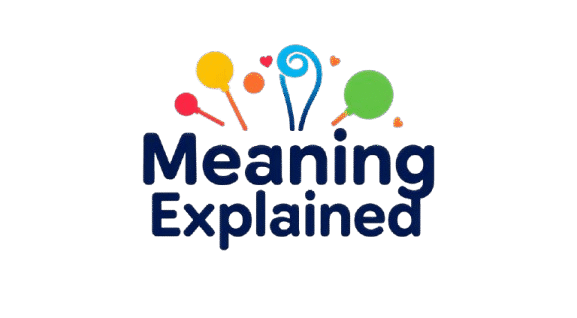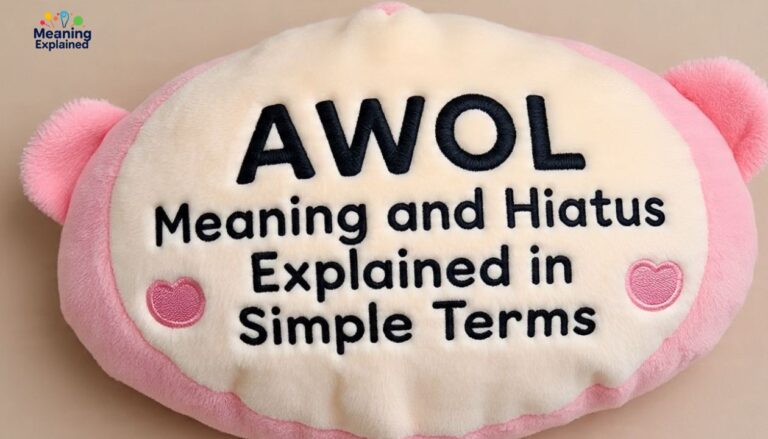AWOL and hiatus are words we often hear in texts, chats, or even at work. They describe being absent or taking a break, but they have different meanings and vibes. This article explains both terms in simple words to help you use them right.
AWOL comes from the military and means someone’s gone without telling anyone. It’s casual but can sound a bit negative, like when a friend ghosts a group chat. Hiatus, on the other hand, is a planned break, often shared politely, like taking time off from work or social media.
Knowing when to use AWOL, hiatus, or better alternatives can make your communication clear and respectful. Whether you’re texting, emailing, or talking, picking the right word matters. Let’s dive into their meanings, examples, and how to avoid tone mistakes.
What Does AWOL Mean?
AWOL stands for Absent Without Leave. It’s a military term for someone missing without permission. Today, it’s used casually to describe someone who’s suddenly unavailable or unresponsive.
- Modern Use: Implies disappearing without notice, often with a hint of irresponsibility.
- Tone: Informal, slightly negative.
Example in informal context:
“She’s been AWOL from our group chat since Friday.”
Example in work context:
“He went AWOL during the project deadline.”
What Does Hiatus Mean?
Hiatus refers to a planned or temporary break from an activity. It’s often intentional, communicated, and carries a neutral or positive tone.
Common Definitions:
- A pause in work or routine.
- A rest for personal reasons.
- A break to recharge or refocus.
Example in professional setting:
“I’m taking a hiatus from freelancing to focus on my studies.”
Example in casual setting:
“He’s on a social media hiatus to enjoy family time.”
AWOL vs. Hiatus: The Difference
| Feature | AWOL | Hiatus |
| Intent | Unplanned, no notice | Planned, often communicated |
| Tone | Slightly negative, casual | Neutral/positive, professional |
| Context | Informal, sarcastic, or critical | Formal, creative, or self-care |
| Example | “She’s AWOL from the meeting.” | “She’s on a hiatus from work.” |
Stand For and Meaning in Text

In texts or social media, AWOL signals someone’s sudden absence, like ghosting a chat or missing deadlines. It’s casual but can sound accusatory.
Example in Text:
“You’ve been AWOL on WhatsApp! Is everything okay?”
Tone Tip:
AWOL can seem harsh if the absence is due to personal issues. Use softer alternatives in sensitive situations to avoid sounding judgmental.
20 Professional, Polite & Casual Alternatives to ‘AWOL’ or ‘Hiatus’
Here are 20 alternatives to fit different tones and contexts, each with usage and examples.
- Taking a Break
- Tone: Casual, friendly.
- Use: Social media, informal chats.
- Example: “I’m taking a break from gaming this week.”
- Out of Office
- Tone: Professional, formal.
- Use: Emails, work settings.
- Example: “I’m out of office until Tuesday.”
- Unavailable at the Moment
- Tone: Neutral, polite.
- Use: Business or formal replies.
- Example: “I’m unavailable at the moment but will get back soon.”
- On Pause
- Tone: Calm, creative.
- Use: Projects, content creation.
- Example: “The vlog is on pause while I plan new content.”
- Offline for a While
- Tone: Relatable, friendly.
- Use: Social media, personal updates.
- Example: “Going offline for a while to clear my head.”
- Stepping Away Temporarily
- Tone: Respectful, balanced.
- Use: Work or team communications.
- Example: “I’m stepping away temporarily for personal reasons.”
- In a Quiet Phase
- Tone: Reflective, poetic.
- Use: Creative or personal posts.
- Example: “My writing is in a quiet phase right now.”
- On Leave
- Tone: Formal, official.
- Use: Workplace, HR settings.
- Example: “She’s on leave until next month.”
- Taking Some Time Off
- Tone: Kind, approachable.
- Use: Emails, personal updates.
- Example: “I’m taking some time off to focus on health.”
- Not Currently Active
- Tone: Factual, neutral.
- Use: Public notices, apps.
- Example: “This profile is not currently active.”
- On a Short Hiatus
- Tone: Elegant, professional.
- Use: Blogs, creative industries.
- Example: “The podcast is on a short hiatus until December.”
- Taking a Breather
- Tone: Casual, light.
- Use: Friends, informal settings.
- Example: “I’m taking a breather from all the chaos.”
- On Downtime
- Tone: Relaxed, modern.
- Use: Tech or casual contexts.
- Example: “I’m on downtime to recharge my energy.”
- Away for Now
- Tone: Neutral, simple.
- Use: General updates.
- Example: “I’m away for now but will be back soon.”
- Taking a Step Back
- Tone: Thoughtful, personal.
- Use: Personal or team updates.
- Example: “I’m taking a step back to focus on family.”
- On a Break from Duties
- Tone: Formal, respectful.
- Use: Work or official settings.
- Example: “She’s on a break from duties this quarter.”
- In a Rest Period
- Tone: Calm, self-care focused.
- Use: Wellness or personal posts.
- Example: “I’m in a rest period to prioritize mental health.”
- Temporarily Inactive
- Tone: Neutral, professional.
- Use: Accounts, projects.
- Example: “This account is temporarily inactive.”
- Recharging for a Bit
- Tone: Friendly, relatable.
- Use: Social media, casual chats.
- Example: “I’m recharging for a bit—see you soon!”
- On a Personal Leave
- Tone: Formal, private.
- Use: Work or sensitive contexts.
- Example: “He’s on personal leave for a few weeks.”
Choosing the Best Alternative Based on Context

Selecting the right phrase depends on your audience and intent. Here’s a guide:
✅ Use “AWOL” when…
- Someone’s absence is sudden and unexplained.
- You’re joking with friends.
- The tone is casual or sarcastic.
- Avoid: In formal emails or sensitive situations.
✅ Use “Hiatus” when…
- Announcing a planned break.
- Communicating to a professional or creative audience.
- Emphasizing a temporary, intentional pause.
✅ Use “Taking time off,” “On leave,” or “Unavailable” when…
- Setting professional boundaries.
- Updating colleagues or clients.
- Keeping the tone neutral and respectful.
✅ Use “Offline,” “Quiet phase,” or “Stepping away” when…
- Addressing a personal audience.
- Highlighting mental health or creativity.
- Explaining an absence gently.
Avoiding Tone Mistakes
Words carry weight. Using the wrong term can misfire:
- ❌ Wrong: Calling a coworker “AWOL” during a personal crisis sounds insensitive.
- ✅ Better: “They’re taking some time off” respects their privacy.
Be mindful of context to avoid seeming accusatory or dismissive.
Final Thoughts
AWOL and hiatus are handy terms for describing absences, but they carry different tones. AWOL is casual and a bit negative, best for informal chats when someone vanishes without notice. Hiatus feels polished and planned, perfect for professional or creative breaks. Using them correctly helps you sound clear and respectful in any conversation.
With many alternatives like “taking a break” or “on leave,” you can pick words that fit the situation. Whether texting friends or emailing colleagues, the right phrase avoids misunderstandings. Choose wisely to keep your tone friendly, professional, or caringhttps://www.merriam-webster.com/dictionary/caring as needed.

